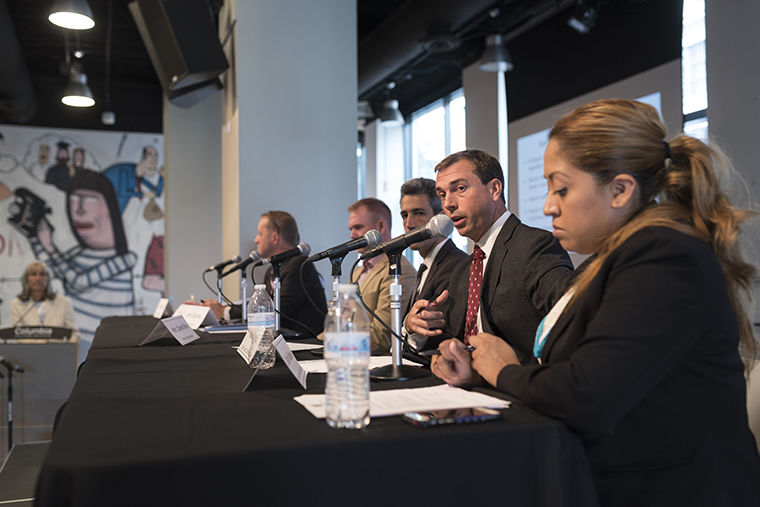Political panels urge student involvement in politics
A multi-panel seminar hosted at Columbia, was aimed at educating students and members of the public about problems in Illinois, according to Sarah Brune, Executive Director of Illinois Campaign for Political Reform.
September 19, 2016
Students and members of various political organizations learned about issues affecting Illinois, including inadequate youth participation in politics and the effects that campaign contributions have on candidates in panels hosted by the college and presented by The Illinois Campaign for Political Reform Sept. 15.
ICPR, a nonprofit, nonpartisan group calling for more transparency and accountability in Illinois government, provides educational events like the seminar held at the 1104 S. Wabash Ave Building, according to Sarah Brune, executive director of ICPR.
The events encourage discussions about important issues concerning politics today, according to Brune.
“They’re a good civic group, [and] whenever we can, we like to bring those groups to campus,” said Suzanne McBride, chair of the Communication and Media Innovation Department who worked with ICPR to coordinate the seminar. “Especially in this case [where] it is a day-long conference that is open to students.”
Twenty speakers participated in the event’s four panels. The speakers came from various political backgrounds and organizations as well as from local and state government positons, according to schedule provided by ICPR.
The panels addressed several topics: increasing access to polling places in Illinois, campaign spending in local and national policy, engaging younger generations in politics and strategies for creating social change.
The seminar, open to the public, was attended by business leaders, nonprofit organization members, government employees and Columbia students.
The speakers were selected for their passion and understanding of the topics, according to Brune.
“When we talk about politics, so often we get bogged down in the horse race of it,” said Jerrick Adams, project director for Election Policy and Civil Liberties Policy for “Ballotpedia” and speaker for the “Increasing Voting Access in Illinois” panel. “[This discussion] keys people into these broader issues going on that aren’t as dramatic, but that are as every bit as important—that impact how that process plays out.”
Younger people have played a role in the election this year by volunteering for candidates and speaking about the policies they support, according to Brune.
“It’s possible the candidate they’ve been fighting for is not going to win,” Brune said. “I want young people to understand how they can work with elected officials even if they don’t agree with them on every point, or a majority of points.”
The panel “Engaging Millennials in Government and Politics,” was specifically designed to urge the younger generation to become more involved in national and local politics, according to the seminar schedule.
Becky Fiala, a senior journalism major who attended the Engaging Millenials seminar, said it is important that people encourage young people to vote and stay engaged in politics.
“It’s easy when you are a student to get caught up in your own life and feel like you’re too busy,” Fiala said. “It is easy now with all the social media. It’s really easy to go on Twitter and Facebook and read articles people post and just see what people’s opinions are.”








